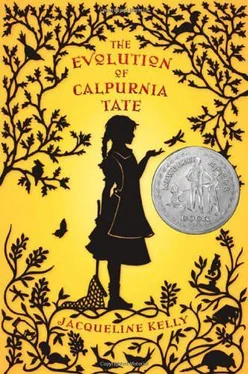Jacqueline Kelly - The Evolution of Calpurnia Tate
Здесь есть возможность читать онлайн «Jacqueline Kelly - The Evolution of Calpurnia Tate» весь текст электронной книги совершенно бесплатно (целиком полную версию без сокращений). В некоторых случаях можно слушать аудио, скачать через торрент в формате fb2 и присутствует краткое содержание. Город: New York, Год выпуска: 2009, ISBN: 2009, Издательство: Macmillan : Henry Holt and Company, Жанр: Детская проза, на английском языке. Описание произведения, (предисловие) а так же отзывы посетителей доступны на портале библиотеки ЛибКат.
- Название:The Evolution of Calpurnia Tate
- Автор:
- Издательство:Macmillan : Henry Holt and Company
- Жанр:
- Год:2009
- Город:New York
- ISBN:978-0-8050-8841-0
- Рейтинг книги:5 / 5. Голосов: 1
-
Избранное:Добавить в избранное
- Отзывы:
-
Ваша оценка:
- 100
- 1
- 2
- 3
- 4
- 5
The Evolution of Calpurnia Tate: краткое содержание, описание и аннотация
Предлагаем к чтению аннотацию, описание, краткое содержание или предисловие (зависит от того, что написал сам автор книги «The Evolution of Calpurnia Tate»). Если вы не нашли необходимую информацию о книге — напишите в комментариях, мы постараемся отыскать её.
The Evolution of Calpurnia Tate — читать онлайн бесплатно полную книгу (весь текст) целиком
Ниже представлен текст книги, разбитый по страницам. Система сохранения места последней прочитанной страницы, позволяет с удобством читать онлайн бесплатно книгу «The Evolution of Calpurnia Tate», без необходимости каждый раз заново искать на чём Вы остановились. Поставьте закладку, и сможете в любой момент перейти на страницу, на которой закончили чтение.
Интервал:
Закладка:
I looked around. Harry stood before a mirror in the corner, dousing himself with lavender pomade and painstakingly parting his hair with a comb, over and over. I had never known him to take such care with his appearance before. As the oldest student, he would play last, but he would have to sit onstage and suffer through the rest of us until it was his turn.
Miss Brown returned, and we received final admonishments from our mothers before they hurried out. My last whispered instructions were from Viola: “Don’t touch that hair. I mean it.” We lined up in silence. No one talked or fidgeted or pushed. Harry winked at me from the back of the line. Lula quaked in front of me, shivering all the way to the tips of her braids.
“Lula,” said Miss Brown, frowning, “you have to put that bucket down.” Lula didn’t move. “Calpurnia, take that bucket from her.” I tapped Lula on the shoulder and said, “Give it over, Lula. It’s time.” She stared at me in mute appeal. I ended up prying it from her damp hands.
Miss Brown said, “Children, this is the time for your very best deportment. Chins up . Chests out .”
She opened the side door to the auditorium, and we marched in behind her to what sounded like hard rain on a tin roof. It was applause, and Lula flinched like a startled fawn. For a moment, I thought she would bolt. I did a rapid and complex series of mental calculations about the range of possible blame that could be assigned to me if she got away, but good old Lula stuck it out and stayed in line.
Then I saw Miss Brown floating majestically upward at the front of the line. Why? How? What was happening? It took me a second to remember that there were a dozen or so steps up to the stage and she was walking up them.
Steps! I had forgotten there were steps. Hundreds and hundreds of steps. I had seen them before, but they were not part of my mental practice; I hadn’t practiced them in my mind’s eye. My ankles went wobbly, and I felt hot and cold all over. Lula glided upward in front of me without any apparent problem. I followed in terror and somehow made it to the top without falling on my face, and then stopped myself just in time from staring into the dazzling limelights that marked the edge of the precipice. We made it to our chairs, and the applause died down like a passing storm.
Miss Brown walked to the edge of the stage and curtsied to the audience. She gave a small speech about this splendid occasion, about Culture making inroads in Caldwell County, oh yes, and how young minds and fingers benefited from exposure to the Great Composers, and how she hoped the parents there would appreciate her hard work in molding their children to value the Finer Things in Life, since we were still living, after all, almost on the edge of the Wild Frontier. She sat down to more applause, and then we got up, one by one, in varying states of misplaced confidence or paralyzing terror.
Do I need to tell you what happened? It was a massacre. Do I have to tell you that Georgie fell backward off the piano stool before he played a single note and had to be hustled off, wailing, in his mother’s arms; that Lula played flawlessly and then got violently sick the second she finished; that Hazel Dauncey’s foot slipped off the pedal in the dead silence before she began, filling the auditorium with a deep reverberating sprrroiiinnnnggg ; that Harry played well but kept looking out at a certain part of the audience for no good reason that I could tell; that I played like a windup clockworks with wooden fingers and forgot to curtsy until Miss Brown hissed at me?
I DON’T REMEMBER much more about the day. I managed to blot it out. But I do remember vowing in the wagon on the way home that I would never do it again. I told Mother and Father this, and there must have been something in my voice because, the next year, despite Miss Brown’s formidable efforts, I handed out the programs, along with Lula, who was barred for life from playing in the recital.
Chapter 7
HARRY GETS A GIRLFRIEND
Domestic races of the same species . . . often have a somewhat monstrous character. . . . They often differ in an extreme degree in some one part. . . .
SHORTLY AFTER THE PIANO RECITAL, danger entered our lives and stalked my family.
I must have dimly realized that Harry would marry one day and have a family of his own, but I reckoned it wouldn’t happen for decades, at least. After all, Harry already had a family, and we were it. I, especially, was it. His own pet.
For some days after the debacle in Lockhart, he’d been acting odd. He stared off into space with a dumb mooncalf look on his face that made you want to slap him. He didn’t answer when spoken to; in fact, he seemed barely present. I had no idea what was going on, but this was not my dear, clever Harry. No, this was some dilute, watery version of him.
I cornered him on the porch and said, “Harry.”
“Hmm?”
“Harry! What’s wrong with you? Are you sick? What’s the matter with you?”
“Hmm,” he said, and smiled.
“Do you feel all right? Should you see the doctor?”
“Don’t worry about me. I’m fine. In fact, I feel grand,” he said.
“Then what is it?”
He smiled mysteriously and pulled a much-handled carte de visite from his pocket. It was one of the new kind with a photographic portrait on it. (“The height of vulgarity,” according to Mother.)
And there She was. A young woman (certainly no longer a girl) with big, protuberant eyes; a fashionably small, squinchy mouth; a long, slender stalk of a neck; and such a great quantity of hair massed above it that she looked like a dandelion puff before the wind decapitated it.
“Isn’t she a corker?” he said, in a congested voice I’d never heard before and hated instantly. I hated her instantly too, for I saw her plain for what She was: a hag, a stooping harpy, a feaster on the flesh of beloved brothers. The Destroyer of My Family’s Happiness. Of my happiness. I stared at this apparition.
“A corker?” I said, reeling. My brother was evaporating before my eyes, and I had to find a way of stopping this dreadful abduction. My thoughts scattered in all directions like undisciplined troops facing their first fire, and it took me a moment to marshal them. But before my first skirmish, I needed some intelligence.
“Where did you meet her, Harry?” I said, innocent as any spy.
For a second, the glaze passed from his eyes and he faltered. I’d struck some tender tissue, but I didn’t understand its import.
“Why, uh, I stopped off at the supper on the grounds in Prairie Lea the other night. They saw me on the road and invited me to visit for a piece.”
Ah. Now, there were two churches in Prairie Lea: the Baptist church, which was acceptable, and the Independent Church of Prairie Lea, which was not. The local Leapers were considered a low and trashy lot by many people. These included my parents, who were both robust Methodists. (Granddaddy had declared he’d had enough sermons to last a lifetime and now chose to spend his Sunday mornings tramping across the fields. Reverend Barker, who enjoyed Granddaddy’s company, seemed to take it in stride. It was only Mother who was embarrassed.) And although Mother had once or twice entertained Leapers in the house, she tended to lump them all together, fairly or not, with snake handlers, fallers, foamers, and other fringe examples of the henhouse sects.
A part of my mind I had no idea I possessed until that moment took over and, like a great general, called all to order. I primed my weapons, surveyed the terrain, picked my target. I could see the battle ahead in time and space. I was the Great Stonewall. I was General Lee himself!
Читать дальшеИнтервал:
Закладка:
Похожие книги на «The Evolution of Calpurnia Tate»
Представляем Вашему вниманию похожие книги на «The Evolution of Calpurnia Tate» списком для выбора. Мы отобрали схожую по названию и смыслу литературу в надежде предоставить читателям больше вариантов отыскать новые, интересные, ещё непрочитанные произведения.
Обсуждение, отзывы о книге «The Evolution of Calpurnia Tate» и просто собственные мнения читателей. Оставьте ваши комментарии, напишите, что Вы думаете о произведении, его смысле или главных героях. Укажите что конкретно понравилось, а что нет, и почему Вы так считаете.












